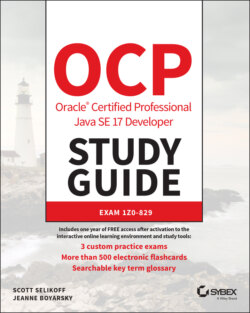Читать книгу OCP Oracle Certified Professional Java SE 17 Developer Study Guide - Jeanne Boyarsky - Страница 54
Java Foundations (1Z0-811)
ОглавлениеThe following table provides a breakdown of this book's exam coverage for the Java Foundations (1Z0-811) exam, showing you the chapter where each objective or subobjective is covered.
A few topics are on the Java Foundations exam but not the 1Z0-829. Those are covered here:
www.selikoff.net/java-foundations
Additionally, the objectives may be updated if Oracle updates the Java Foundations exam for a later version of Java. Check our website for those updates as well.
| Exam Objective | Chapter |
|---|---|
| What is Java? | |
| Describe the features of Java | 1 |
| Describe the real-world applications of Java | 1 + online |
| Java Basics | |
| Describe the Java Development Kit (JDK) and the Java Runtime Environment (JRE) | 1 |
| Describe the components of object-oriented programming | 1 |
| Describe the components of a basic Java program | 1 |
| Compile and execute a Java program | 1 |
| Basic Java Elements | |
| Identify the conventions to be followed in a Java program | 1 |
| Use Java reserved words | 1 |
| Use single-line and multi-line comments in Java programs | 1 |
| Import other Java packages to make them accessible in your code | 1 |
| Describe the java.lang package | 1 |
| Working with Java Data Types | |
| Declare and initialize variables including a variable using final | 1 |
| Cast a value from one data type to another including automatic and manual promotion | 2 |
| Declare and initialize a String variable | 1 |
| Working with Java Operators | |
| Use basic arithmetic operators to manipulate data including +, -, *, /, and % | 2 |
| Use the increment and decrement operators | 2 |
| Use relational operators including ==, !=, >, >=, <, and <= | 2 |
| Use arithmetic assignment operators | 2 |
| Use conditional operators including &&, ||, and ? | 2 |
| Describe the operator precedence and use of parentheses | 2 |
| Working with the String Class | |
| Develop code that uses methods from the String class | 4 |
| Format Strings using escape sequences including %d, %n, and %s | 11 |
| Working with Random and Math Classes | |
| Use the Random class | Online |
| Use the Math class | 4 |
| Using Decision Statements | |
| Use the decision making statement (if-then and if-then-else) | 3 |
| Use the switch statement | 3 |
| Compare how == differs between primitives and objects | 4 |
| Compare two String objects by using the compareTo and equals methods | 4 |
| Using Looping Statements | |
| Describe looping statements | 3 |
| Use a for loop including an enhanced for loop | 3 |
| Use a while loop | 3 |
| Use a do- while loop | 3 |
| Compare and contrast the for, while, and do-while loops | 3 |
| Develop code that uses break and continue statements | 3 |
| Debugging and Exception Handling | |
| Identify syntax and logic errors | 1, 2, 3 |
| Use exception handling | 11 |
| Handle common exceptions thrown | 11 |
| Use try and catch blocks | 11 |
| Arrays and ArrayLists | |
| Use a one-dimensional array | 4 |
| Create and manipulate an ArrayList | 9 |
| Traverse the elements of an ArrayList by using iterators and loops including the enhanced for loop | 9 |
| Compare an array and an ArrayList | 4, 9 |
| Classes and Constructors | |
| Create a new class including a main method | 1 |
| Use the private modifier | 5 |
| Describe the relationship between an object and its members | 6 |
| Describe the difference between a class variable, an instance variable, and a local variable | 1, 6 |
| Develop code that creates an object's default constructor and modifies the object's fields | 6 |
| Use constructors with and without parameters | 6 |
| Develop code that overloads constructors | 6 |
| Java Methods | |
| Describe and create a method | 5 |
| Create and use accessor and mutator methods | 5 |
| Create overloaded methods | 5 |
| Describe a static method and demonstrate its use within a program | 5 |
